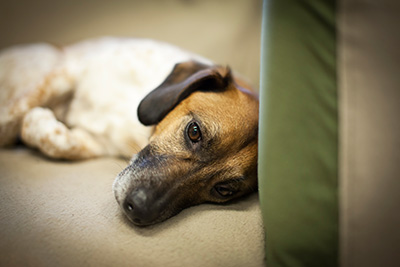

Is your dog having regular bowel movements? Odds are that you know the answer to this question. Gone are the days when dogs roamed freely and pet owners, when questioned, honestly had no idea whatsoever of their dog’s bathroom habits. Nowadays, between leash laws, regulations and an increased public awareness of the need for speedy and hygienic removal of pet waste, even in the backyard, many pet parents tend to be intimately aware of a dog’s schedule and output.
Unpleasant or not, this is a good thing because it’s important to be aware of, and to pay attention to, our pets elimination habits. No doubt we, as veterinarians, see plenty of dogs in our offices whose owners brought them in because of diarrhea, sometimes even very minor cases of diarrhea. This is probably because having a dog with diarrhea is not only a concern for the dog, but it also tends to be an inconvenience for the guardian. On the other hand, diminished stool output often doesn’t raise such urgent responses.
Certainly, an occasional “off day” that resolves itself naturally is not cause for alarm, but constipation can be very serious, and often does require a trip to the veterinarian.
Symptoms associated with constipation
- Difficulty passing stools and/or straining to defecate: This is always a reason to have your dog examined by your veterinarian. Not only because he’s obviously uncomfortable, but also because male dogs especially can develop urinary blockages too and those are life-threatening emergencies.
- Hard, small stools: Even if your dog is having bowel movement on a routine basis but those stools are small, hard or dry that is still an indication that there is a problem that should be evaluated.
- No stools at all: If your dog has not had any bowel movements for 2-3 days he is constipated and needs to be examined.
- Small amounts of liquid stool: This may seem counterintuitive, but if your dog is only passing small amounts of liquid it may be because he is so constipated that the immoveable, hard, mass of stool is blocking the passage of anything but little bits of liquid or ribbons of soft stool that manage to squeeze by. He should be checked.
- Decreased appetite/activity/depression: These are non-specific symptoms of many different problems so you need a diagnosis of the underlying cause.
- Vomiting: Vomiting is more common in constipated cats, but can occur in the dogs with constipation.
Causes of constipation and what can you do about it
- Dehydration is a very common cause of constipation. If your dog doesn’t take in more liquid than he loses, because of inadequate consumption or excessive loss (through exertion or metabolic disease) his body will absorb as much as it can from his bowels—resulting in harder, drier stools. In many cases fluid therapy (oral, dietary, or medical) may be indicated.
- Dietary issues themselves often come into play for controlling regularity. Too much fiber, too little fiber or too little liquid in your dog’s diet can affect stool consistency and passage. In addition, some dogs are inclined to eat poorly digestible substances (wood, bones, rocks, plastics, fabrics, you name it) which can cause constipation or more serious intestinal blockages.
- Discomfort (potentially from hip arthritis or lower back pain) can also make it difficult and/or uncomfortable for your dog to have a normal bowel movement. Medications for pain or joint health may be beneficial.
- Obstructions from physical disorders can also limit the movement of stool. A narrowed pelvic canal from a prior injury, anal gland disorders, tumors, prostatic enlargement and hernias can all cause constipation. Your veterinarian may recommend XRays and/or ultrasound imaging to rule these factors in or out of the equation.
- Motility disorders can diminish the function of the muscles in the colon, causing constipation. If the muscles don’t contract normally then the stool doesn’t move, the colon wall has to stretch beyond its natural limits, and then it is even harder for the colon to function. Luckily this progressive disorder is not as common in dogs as it is in cats.
If you have any concerns at all about your dog’s bowel movements, see your veterinarian. After examining your dog and determining any underlying problems, your veterinarian can work with you to make specific recommendations about medical intervention, dietary management, the use of stool softeners, laxatives or other medications to maintain colon health and regularity.
If you have any questions or concerns, you should always visit or call your veterinarian -- they are your best resource to ensure the health and well-being of your pets.
